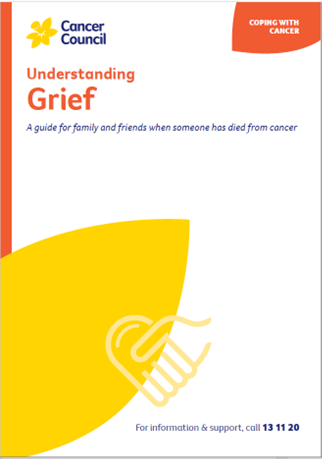- Home
- Cancer Information
- Schools and teachers
- Cancer in the school community
- The bereaved school community
- When a parent dies
When a parent dies
When a parent in the school community dies, the reactions of community members can vary. If the parent was a well-known community member, people may outwardly grieve the loss. If the parent was not particularly well known in the school community, many people may be unaware of their death.
Students who know a classmate’s parent has died will probably worry about their own family. They might want to express sympathetic sentiments,
The bereaved school community and wonder how to support their friend and what to say. With the family’s permission, some students may attend the funeral service to support their classmate, as may staff and other parents.
Other parents may also reach out to help the family in the weeks and months afterwards. Parents can help make meals, keep track of the child’s homework, or provide transport to school and after-school activities.
You and other school staff members will probably be aware of the death, and you should explain the situation to students, if necessary. You will need to grieve the death in your own way and provide in-class support (such as more flexible homework deadlines) to a student who has lost a parent.
When my husband died, it was after his cancer metastasised and he had a sudden stroke on our son’s seventh birthday. That was so hard. When my son returned to school, the teacher and all the kids had made a book about Joey’s dad. It was so thoughtful, and it means a lot to have a tangible keepsake like that.
Patricia, parent whose husband had cancer
→ READ MORE: When a student’s sibling dies
Podcast: Coping with Grief
Listen to more episodes from our podcast for people affected by cancer
More resources
Claire Tobin, Principal Medical Advisor, Department of Education and Training, VIC; Dr Antoinette Anazodo, Paediatric and Adolescent Oncologist, Sydney Children’s Hospital and Prince of Wales Hospital, Director of The Sydney Youth Cancer Service, and Conjoint Senior Researcher, University of New South Wales, NSW; Lisa Barrow, Clinical Nurse Educator, Children’s Cancer Centre, Royal Children’s Hospital, Melbourne, VIC; Margo Bulic, Psychosocial Support Worker, CanTeen, ACT; Amber Copeland, 13 11 20 Consultant, Cancer Council Queensland; Donna Drew, Clinical Nurse Consultant, Paediatric Oncology/Palliative Care, Kids Cancer Centre, Sydney Children’s Hospital, Randwick, NSW; Allesha Fecondo, Education Consultant, Victorian Paediatric Rehabilitation Service, and Education Liaison, Ronald McDonald Learning Program, Ronald McDonald House Charities Australia, VIC; John Friedsam, General Manager of Divisions, CanTeen Australia, NSW; Pina Hutcheson, President, Catholic Primary Principals’ Association of WA; Cara Irvine, Year 8 Coordinator, Alfred Deakin High School, ACT; Andrew Long, Assistant Director, Policy and Research, Independent Schools Council of Australia, ACT; Dr Alistair Lum, Post-doctoral Research Fellow – Behavioural Sciences Unit, Sydney Children’s Hospital, University of New South Wales, NSW; Kristine Luszczynski, Learning Program Manager, Quality and Standards, Ronald McDonald House Charities Australia, NSW; Anita Neville, National Manager, Ronald McDonald Learning Program, Ronald McDonald House Charities Australia, VIC; NSW Department of Education, NSW; Mandy Roney, Consumer; Shannon Rush, Primary School Program Manager, Camp Quality, SA; Luke Wade, Education and Career Support Consultant, Redkite, QLD.
View the Cancer Council NSW editorial policy.
View all publications or call 13 11 20 for free printed copies.
Need to talk?
Support services
Work and cancer
Information for employees, employers and workplaces dealing with cancer
Need legal and financial assistance?
Practical advice and support after a death from cancer
Cancer information
What is grief?
Common grief reactions, such as sadness, anger, relief and fear
Workplace fact sheet: Death and bereavement
Information for employers when a staff member dies or is bereaved

